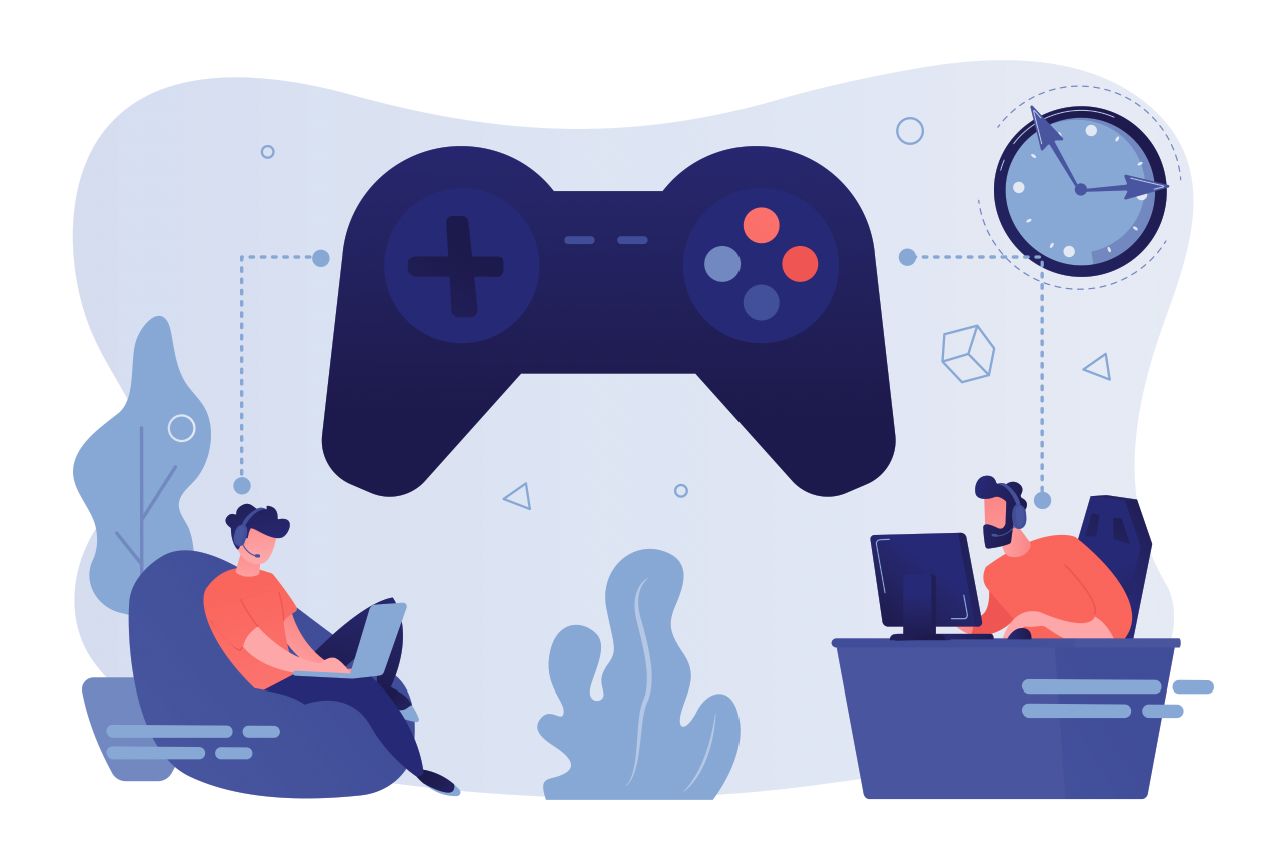Introduction
Welcome to the digital age, where online gaming has become a popular form of entertainment among young teenagers. While it can offer opportunities for socializing, skill development, and even career prospects, excessive online gaming can have negative effects on a teenager’s well-being and overall life balance. As a parent or guardian, it is important to establish healthy boundaries and rules to ensure that online gaming remains a positive and enjoyable activity for your teenager.
Excessive online gaming can lead to various issues, such as neglecting schoolwork, a decline in physical fitness, strained interpersonal relationships, and even mental health problems. The immersive nature of these games can often make it challenging for teenagers to regulate their screen time and balance it with other essential activities. However, with the right approach and strategies, parents can play a pivotal role in helping their teenagers establish a healthy relationship with online gaming.
This article will outline practical tips on how to limit online gaming for young teenagers. These suggestions can help you strike a balance between allowing your teenager to indulge in their passion for online gaming while also ensuring they prioritize their responsibilities and well-being.
Understanding the impact of excessive online gaming
Excessive online gaming can have significant effects on a teenager’s life and well-being. It is crucial to understand these impacts in order to address them effectively. Firstly, excessive gaming can lead to a sedentary lifestyle, as teenagers spend long hours sitting in front of a screen instead of engaging in physical activities. This lack of physical exercise can contribute to health issues such as obesity, muscle weakness, and cardiovascular problems. Moreover, prolonged gaming sessions can disrupt sleep patterns, leading to fatigue and difficulties concentrating during the day.
Excessive online gaming can also negatively impact academic performance. When teenagers prioritize gaming over their studies, their focus and commitment to achieving academic goals may suffer. This can result in declining grades, missed assignments, and reduced motivation for learning. Additionally, excessive gaming can impact interpersonal relationships, as teenagers may withdraw from family and friends in favor of spending time gaming online. This isolation can hinder social development and lead to feelings of loneliness and alienation.
Furthermore, online gaming addiction is a real concern. Similar to other forms of addiction, excessive gaming can lead to psychological dependence, affecting a teenager’s ability to control their gaming habits. They may experience symptoms such as restlessness, irritability, and a strong urge to play even when it is detrimental to their well-being. It is important for parents to recognize the signs of addiction and take appropriate measures to address it.
By understanding the potential impacts of excessive online gaming, parents can approach the issue with empathy and work towards finding a balanced approach that allows their teenager to enjoy gaming while also prioritizing other aspects of their life.
Setting boundaries and rules
Establishing clear boundaries and rules around online gaming is essential to help your teenager develop healthy habits and maintain a balanced lifestyle. Here are some strategies you can implement:
- Define specific time limits: Set a daily or weekly time limit for online gaming sessions. This will help your teenager understand how much time they can dedicate to gaming while ensuring they have enough time for other activities like studying, socializing, and physical exercise.
- Create non-negotiable timeframes: Determine specific timeframes during the day when gaming is not allowed. For example, you may establish a rule that gaming is not permitted during meal times, homework hours, or before bedtime. This will promote a healthier balance and prioritize other important tasks and activities.
- Have a designated gaming area: Designate a specific area in your home where gaming is allowed. This will help create a distinction between gaming time and other activities, such as studying or family time. It can also make it easier to monitor and manage your teenager’s gaming habits.
- Enforce consequences: Clearly communicate the consequences of breaking the established rules. This can include reducing gaming time, temporarily restricting access to gaming devices, or loss of certain privileges. Consistently enforcing these consequences will help your teenager understand the importance of adhering to the boundaries set.
When setting boundaries and rules, it is crucial to involve your teenager in the decision-making process. Have an open and respectful conversation where you explain your concerns and reasons behind the rules. Encourage them to share their perspective and work together to find a compromise that both parties can agree upon.
Remember, the goal is not to completely eliminate online gaming but rather to ensure it is a healthy and balanced part of your teenager’s life. By setting boundaries and establishing clear rules, you can help them develop self-discipline, time management skills, and a sense of responsibility.
Encouraging alternative activities
While online gaming can be a fun and engaging activity, it is important to encourage your teenager to explore a variety of other activities to promote a well-rounded lifestyle. Here are some ways you can encourage alternative activities:
- Sports and physical activities: Encourage your teenager to participate in sports or engage in physical activities they enjoy. This not only promotes physical fitness but also provides opportunities for social interaction and personal growth.
- Hobbies and creative pursuits: Help your teenager explore and develop other interests or hobbies, such as painting, playing a musical instrument, writing, or photography. These activities can provide a creative outlet and help them discover new passions.
- Volunteer work or community involvement: Encourage your teenager to get involved in volunteer work or community projects. This can help them develop empathy, compassion, and a sense of responsibility towards others while also providing opportunities for personal growth.
- Academic and educational pursuits: Foster a love for learning by encouraging your teenager to explore educational activities outside of school. This can include reading books, engaging in online courses, or participating in educational workshops or programs.
- Family and social activities: Promote quality time with family and friends by organizing family outings, game nights, or social events. Encourage your teenager to maintain strong relationships offline and value face-to-face interactions.
By promoting alternative activities, you are providing your teenager with a diverse range of experiences and opportunities for personal growth. These activities can enhance their well-being, build new skills, and open doors to new friendships and interests. Keep in mind that each teenager is unique, so it is important to support their individual interests and passions while gently encouraging them to explore new activities.
Monitoring screen time
Monitoring your teenager’s screen time is crucial in ensuring they maintain a healthy balance between online gaming and other activities. Here are some effective strategies for monitoring screen time:
- Set clear expectations: Clearly communicate your expectations regarding screen time limits and the importance of using technology responsibly. Ensure your teenager understands the reasons behind these expectations and the potential consequences of excessive screen time.
- Use parental control tools: Take advantage of parental control features available on devices and gaming platforms. These tools allow you to set time limits, restrict access to certain content, and monitor your teenager’s online activities. Familiarize yourself with these tools and configure them according to your family’s guidelines.
- Track and review usage: Keep track of your teenager’s screen time and regularly review it together. This can be done through built-in device features, apps, or even manually recording their usage. Analyzing their screen time patterns can help identify any excessive gaming habits or areas that require adjustment.
- Encourage breaks and offline activities: Encourage your teenager to take regular breaks from screens and engage in offline activities. Set designated periods during the day when screens are turned off, allowing time for physical activity, hobbies, or family interactions.
- Lead by example: Be a positive role model by demonstrating healthy screen time habits yourself. Show your teenager that you also prioritize offline activities, engage in meaningful conversations, and manage your screen usage responsibly. This will reinforce the importance of finding a healthy balance.
While it is important to monitor screen time, it is also essential to create an environment of trust and open communication. Discuss the reasons behind monitoring and assure your teenager that it is not a means of control, but rather a tool to ensure their well-being and maintain a healthy lifestyle. Encourage them to share any concerns or challenges they may face with screen time to foster a collaborative and supportive approach.
Creating a designated gaming schedule
Establishing a designated gaming schedule can help your teenager better manage their time and maintain a healthy balance between online gaming and other activities. Here are some strategies for creating an effective gaming schedule:
- Involve your teenager: Include your teenager in the process of creating the gaming schedule to give them a sense of ownership and responsibility. Discuss their preferred gaming times and work together to find a schedule that accommodates their interests while also considering other commitments.
- Set specific time slots: Allocate specific time slots for gaming within the schedule. This can be done daily or on specific days of the week, depending on your teenager’s preferences and availability. Having designated time slots helps establish routine and prevents gaming from encroaching on other important activities.
- Balance with other activities: Ensure the gaming schedule includes a balance of other activities, such as schoolwork, physical fitness, socializing, and hobbies. Encourage your teenager to prioritize these activities and allocate sufficient time for each, ensuring they have a well-rounded lifestyle.
- Consider peak times: Take into account peak times for online gaming, such as weekends or evenings, when your teenager may have more free time. Allocating gaming time during these periods can help prevent it from becoming a constant distraction during other parts of the day.
- Reinforce schedule adherence: Encourage your teenager to stick to the gaming schedule and respect the allocated time slots. Remind them of the importance of balancing gaming with other responsibilities and activities. Consistency and adherence to the schedule will instill a sense of discipline and time management.
Creating a designated gaming schedule not only helps manage time effectively but also reduces conflicts and negotiations surrounding gaming. It sets clear expectations and boundaries while allowing your teenager to enjoy their gaming sessions without feeling guilty or constantly scrambling to find time for other important tasks. Regularly review and adjust the schedule as necessary to accommodate changes in your teenager’s activities and commitments.
Utilizing parental controls and restrictions
Parental controls and restrictions are powerful tools that can help you manage and regulate your teenager’s online gaming activities. By utilizing these features, you can ensure a safer and more controlled gaming environment. Here’s how you can effectively use parental controls and restrictions:
- Research available options: Familiarize yourself with the various parental control features and software available for gaming platforms, devices, and internet browsers. Each platform and device may offer different settings, so understanding the options will help you make informed decisions.
- Set age-appropriate content filters: Activate content filters that restrict your teenager’s access to inappropriate or mature content. This can help protect them from exposure to graphic violence, explicit language, and other unsuitable material.
- Implement time limits: Utilize time limit settings to control the amount of time your teenager can spend gaming each day or week. This feature allows you to automatically enforce the established gaming schedule and prevent excessive screen time.
- Manage in-game purchases: Many games offer in-app or in-game purchases. To prevent unexpected expenses and overspending, configure settings that require parental permission or restrict in-game purchases altogether.
- Monitor online interactions: Enable settings that allow you to monitor your teenager’s online interactions while gaming. This can help protect them from cyberbullying, inappropriate conversations, or predatory behavior. Educate your teenager about online safety and encourage them to report any concerning interactions to you.
- Establish device curfew: Utilize device curfew settings to restrict access to gaming devices during specific hours, such as bedtime or school hours. This promotes healthier screen time habits and ensures your teenager prioritizes sleep and academic responsibilities.
While parental controls and restrictions provide valuable safeguards, it is important to balance their use with open communication and trust. Discuss with your teenager the reasons behind implementing these measures and emphasize the importance of their online safety and well-being. Encourage ongoing conversations about responsible gaming and online behavior to foster a healthy digital environment.
Communicating openly with your teenager
Open communication is key in addressing online gaming habits and maintaining a healthy relationship with your teenager. By fostering a supportive and understanding environment, you can have meaningful discussions about their gaming habits and ensure they feel heard and supported. Here are some tips for open communication:
- Listen without judgment: Create a safe space for your teenager to express their thoughts and concerns about online gaming. Listen attentively to their perspective without immediately passing judgment or criticizing their choices. This will help foster trust and encourage them to be more open about their gaming habits.
- Ask open-ended questions: Use open-ended questions to encourage your teenager to share more about their gaming experiences. Instead of asking simple yes or no questions, prompt them to elaborate on their gaming interests, their favorite games, or the reasons why they enjoy playing. This can lead to more in-depth conversations and deeper understanding.
- Express your concerns: Share your concerns about excessive gaming in a non-confrontational and non-judgmental manner. Explain the impact it may have on their well-being, academics, or other areas of their life. Use “I” statements to express how their gaming habits affect you and the family, emphasizing that your intention is to support their overall health and balance.
- Collaborate on solutions: Work together with your teenager to find mutually agreed-upon solutions and strategies for managing their gaming time. Encourage them to contribute their own ideas and suggestions. This collaborative approach gives them a sense of ownership and promotes their self-discipline and decision-making skills.
- Set realistic expectations: Have a conversation about realistic expectations and compromises. Help your teenager understand the importance of balancing gaming with other activities and responsibilities. Encourage them to prioritize their academics, physical health, and social interactions while still allowing them to enjoy their passion for gaming.
- Provide support and resources: Offer your support and guidance throughout the process. Share resources, such as educational articles or documentaries, that highlight the importance of healthy gaming habits. If needed, consider seeking professional help or counseling if gaming habits become a source of concern or addiction.
Remember that open communication is an ongoing process. Stay genuinely interested in your teenager’s gaming experiences and be open to revisiting the conversation as needed. By fostering open dialogue, you can better understand their perspective, establish common ground, and work towards a balanced approach that meets both your expectations and their needs.
Seeking professional guidance if needed
While setting boundaries and implementing strategies can be effective in managing online gaming, there may be instances where seeking professional guidance is necessary. If you notice that your teenager’s gaming habits are negatively impacting their physical or mental well-being, it is important to consider professional help. Here are some steps you can take:
- Recognize the signs: Pay attention to any warning signs that indicate your teenager may be struggling with excessive gaming. These signs may include declining academic performance, neglecting personal hygiene, withdrawal from social activities, irritability, or changes in sleep patterns. Trust your instincts and take proactive steps if you notice these signs.
- Talk to a healthcare professional: Consult with your child’s pediatrician, family doctor, or a mental health professional who specializes in adolescent behavior. These professionals can provide expert guidance, assess the situation, and offer appropriate advice for managing your teenager’s gaming habits.
- Consider therapy or counseling: If your teenager is struggling with gaming addiction or other underlying issues, therapy or counseling can be beneficial. A qualified therapist can help your teenager develop healthier coping mechanisms, address any underlying psychological factors, and provide support on their journey to balance and well-being.
- Join support groups: Participate in support groups specifically designed for parents and families dealing with online gaming addiction or excessive gaming. These groups can provide valuable insights, resources, and emotional support from individuals who have gone through similar experiences.
- Stay involved and supportive: Show your teenager that you are there for them throughout the process. Offer your support, attend therapy sessions or appointments, and actively engage in the recommended strategies and interventions. Your involvement and support can have a significant positive impact on their progress.
Remember that seeking professional guidance does not indicate failure as a parent, but rather demonstrates your commitment to your teenager’s well-being. Professionals have the expertise and resources to navigate the complexities of gaming addiction and related issues. They can provide tailored recommendations and strategies to help your teenager develop healthier habits and manage their gaming time effectively.
Ultimately, your proactive approach in seeking professional help can make a meaningful difference in your teenager’s life, helping them regain balance, develop resilience, and make healthier choices both online and offline.
Conclusion
Helping your teenager establish a healthy relationship with online gaming is crucial in today’s digital age. By understanding the impact of excessive gaming and implementing strategies to limit its presence, you can support their overall well-being and ensure a balanced lifestyle. From setting boundaries and rules to encouraging alternative activities, monitoring screen time, and utilizing parental controls, there are various effective approaches to manage online gaming.
Open communication plays a vital role in this journey. By fostering a supportive environment, listening to your teenager’s perspective, and collaborating on solutions, you can effectively address their gaming habits and maintain a healthy relationship built on trust and understanding. Additionally, seeking professional guidance, if necessary, can provide valuable insights and support in managing gaming addiction or related issues.
Remember, the goal is not to eliminate online gaming entirely, but rather to establish boundaries and prioritize other essential aspects of life. By finding the right balance, your teenager can continue to enjoy the benefits of online gaming while also engaging in other activities, pursuing their interests, and developing important life skills.
By implementing these strategies and fostering a healthy approach to online gaming, you can guide your teenager in developing responsible habits, ensuring their overall well-being, and helping them flourish in both their virtual and offline worlds.

























